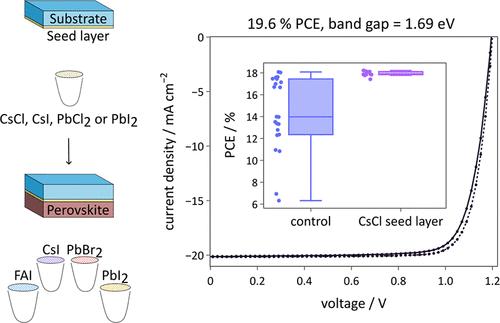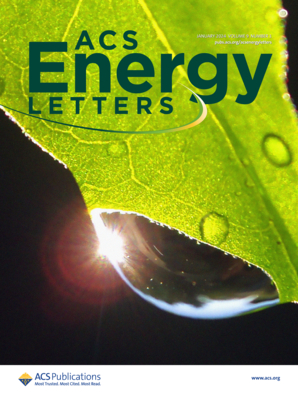Seed Layers for Wide-Band Gap Coevaporated Perovskite Solar Cells: CsCl Regulates Band Gap and Reduces Process Variability
IF 19.3
1区 材料科学
Q1 CHEMISTRY, PHYSICAL
引用次数: 0
Abstract
Coevaporation, an up-scalable deposition technique that allows for conformal coverage of textured industrial silicon bottom cells, is particularly suited for application in perovskite-silicon tandem solar cells (PSTs). However, research on coevaporated perovskites with an appropriate band gap for PSTs remains limited, with lower efficiency and reproducibility than solution-processed films. Here, we present a simple approach using a thin layer of a precursor material, namely, PbI2, PbCl2, CsI, or CsCl, as a seed layer on the hole-transporting layer/perovskite interface. We find CsCl to be the optimal seed layer for our system. Perovskite single junction cells prepared with CsCl seed layer exhibit 19.6% power conversion efficiency with a band gap of 1.69 eV and improved long-term stability. We attribute the observed enhancements to the more precise and consistent incorporation of the organic precursor into the perovskite lattice during the film growth. This work demonstrates that engineering the substrate surface is crucial for achieving well-controlled growth of efficient and stable coevaporated wide-band gap perovskite solar cells.

用于宽带隙共蒸发过氧化物太阳能电池的种子层:氯化铯调节带隙并降低工艺变异性
共蒸镀是一种可升级的沉积技术,可实现纹理工业硅底电池的保形覆盖,特别适合应用于过氧化物硅串联太阳能电池(PST)。然而,对具有适用于 PST 的适当带隙的共蒸发过氧化物的研究仍然有限,其效率和可重复性均低于溶液加工薄膜。在此,我们介绍一种简单的方法,即在空穴传输层/包晶界面上使用一薄层前驱体材料(即 PbI2、PbCl2、CsI 或 CsCl)作为种子层。我们发现 CsCl 是我们系统的最佳种子层。使用氯化铯种子层制备的过氧化物单结电池显示出 19.6% 的功率转换效率,带隙为 1.69 eV,并且长期稳定性得到改善。我们将观察到的提高归因于在薄膜生长过程中,有机前驱体更精确、更稳定地融入了包晶晶格。这项研究表明,基底表面的工程设计对于实现高效、稳定的共蒸发宽带隙过氧化物太阳能电池的良好生长至关重要。
本文章由计算机程序翻译,如有差异,请以英文原文为准。
求助全文
约1分钟内获得全文
求助全文
来源期刊

ACS Energy Letters
Energy-Renewable Energy, Sustainability and the Environment
CiteScore
31.20
自引率
5.00%
发文量
469
审稿时长
1 months
期刊介绍:
ACS Energy Letters is a monthly journal that publishes papers reporting new scientific advances in energy research. The journal focuses on topics that are of interest to scientists working in the fundamental and applied sciences. Rapid publication is a central criterion for acceptance, and the journal is known for its quick publication times, with an average of 4-6 weeks from submission to web publication in As Soon As Publishable format.
ACS Energy Letters is ranked as the number one journal in the Web of Science Electrochemistry category. It also ranks within the top 10 journals for Physical Chemistry, Energy & Fuels, and Nanoscience & Nanotechnology.
The journal offers several types of articles, including Letters, Energy Express, Perspectives, Reviews, Editorials, Viewpoints and Energy Focus. Additionally, authors have the option to submit videos that summarize or support the information presented in a Perspective or Review article, which can be highlighted on the journal's website. ACS Energy Letters is abstracted and indexed in Chemical Abstracts Service/SciFinder, EBSCO-summon, PubMed, Web of Science, Scopus and Portico.
 求助内容:
求助内容: 应助结果提醒方式:
应助结果提醒方式:


